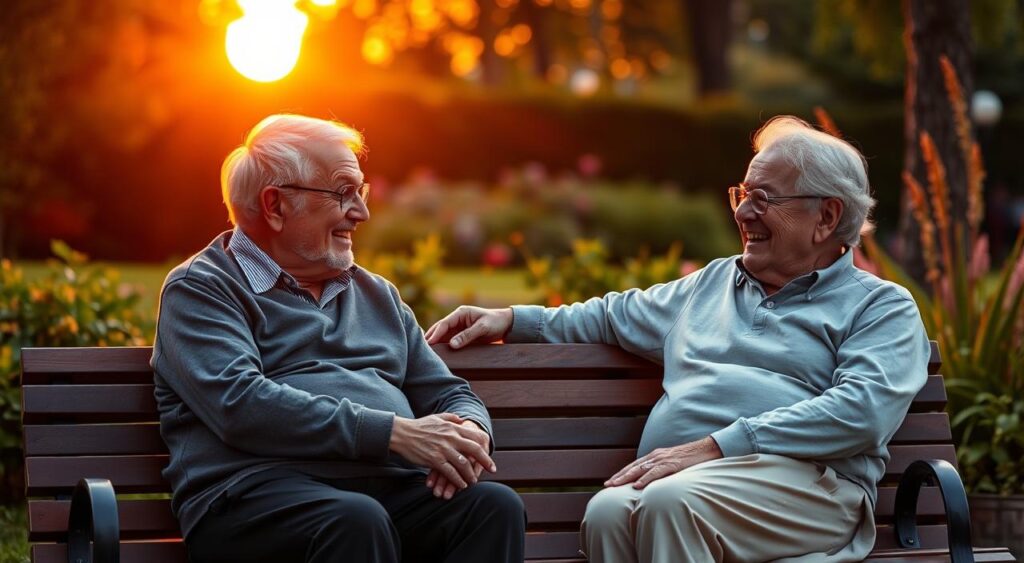Entering retirement changes a lot, but keeping your friendships is very important. The friends you made at work, including older workers and older adults, play a big part in your happiness and well-being, even when discussing working conditions. Workplace friendships and retirement experiences can differ across ages, especially for those aged 50 and above, with differences in meaningful work, flexibility, health, and social engagement. Keeping these friendships alive adds joy to your social life and supports you during big changes. The emotional impact of maintaining or losing workplace friendships is often felt deeply, shaping your sense of satisfaction and fulfillment during this transition.
It’s key to know how to keep your social life busy after retirement and how your careers influence this. The types of jobs you held and the organization you worked for can shape the nature and strength of workplace friendships, as different jobs and organizational cultures impact social connections and support systems. You can make plans to meet friends regularly or use tech to stay in touch and discuss working conditions. These efforts keep you connected and social after stopping work. Workplace friendships play an important role in supporting your well-being and coping abilities during retirement.
Key Takeaways
- Strong social connections are essential for psychological and emotional health post-retirement.
- Maintaining workplace friendships can provide stability during the transition into retirement.
- Employing various strategies, such as meetups and technology, can help you stay connected.
- Engaging in new social activities can also broaden your network post-retirement.
- Being proactive about maintaining friendships improves your overall quality of life.
Understanding the Importance of Workplace Friendships
Workplace friendships are key to your professional life. They go beyond the office, giving important social support and contributing to job satisfaction. Having friends at work makes you feel better, work better, and stay longer.
Research shows that workplace friendships significantly enhance job satisfaction and help in coping with stress overall well-being, with more than two-thirds of older workers reporting that they find their work meaningful, underscoring the importance of these relationships.
This bond is also crucial as you move into retirement. It helps with the emotional adjustment, especially when family support is involved .
Why Friendships Matter in the Workplace
Having friends at work makes your job more fun and fulfilling. These friendships also add meaning to your work life by providing a sense of purpose and connection. It’s good to learn how to keep these friendships after retiring, which many retirees find crucial . These relationships support us during hard work and stress.
They help us stay strong and work well together.
The Role of Social Connections in Retirement
When you retire, friendships become more important. Keeping work friendships alive helps you stay in touch. These relationships bring stability as retired people start this new life stage.
Activities and meetups with past colleagues can make you happier. Spending time in the company of others provides emotional support and boosts your well-being. They reduce the chance of feeling alone.
Possible Emotional Impacts of Losing Friendships
Losing work friends can be really tough. The loss of these friendships can affect retirees’ emotional well-being by reducing their support networks and impacting their sense of belonging. It can make retirees feel lonely or even lead to depression. Acknowledging these friendships’ value and how to maintain them is key.
This way, you can handle the emotional challenges of post-retirement better. Staying socially connected and trying new ways to make friends are important.
Challenges in Maintaining Friendships After Retirement
Retirement changes how we connect with friends. It brings shifts in routines, moves, and changing interests. These new situations make keeping friendships in retirement a unique challenge, and without active effort, there is a risk of social or emotional decline.
Changes in Daily Routine and Lifestyle
Entering retirement transforms your daily life. Without a workday structure, it’s hard to sync up with friends who are still working. Differences in work hours between retirees and their working friends can make it challenging to maintain regular contact and sustain friendships. To stay social, retirees need to find new ways to connect.
Geographic Separation of Friends
Friends often move apart after retiring. They might relocate for family or better weather. Staying in touch across distances with a family member takes effort, personal resources, and tech. Regular visits or online meetings keep friendships alive.
Different Priorities and Interests
Your interests may change once you retire, just like your friends’. If not careful, friendships can drift apart. Discovering new common interests helps keep friendships strong. Pursuing hobbies together is a great way for retirees to maintain friendships and enjoy shared activities.

An active effort is needed to maintain those bonds. Being aware of these hurdles, including the risk of depression, is key to keeping connections meaningful.
Emotional and Psychological Adjustments
Retiring can bring feelings of loss as daily interactions with coworkers diminish. The change in social environment requires retirees to adjust emotionally and psychologically. Without the regular social interactions provided by the workplace, retirees may experience loneliness or a sense of isolation. Recognizing these feelings and seeking new social outlets can help mitigate these challenges.
Impact of Physical and Mental Health
As retirees grow older, changes in physical and mental health can affect their ability to engage socially. Health issues may limit mobility or energy, making it harder to participate in social activities or maintain regular exercise routines. Conditions such as arthritis, high blood pressure, or other chronic illnesses common among older adults can restrict involvement in group activities or outings with friends. Additionally, mental health challenges like depression or cognitive decline may reduce motivation or the capacity to sustain social interactions.
Maintaining physical and mental health is crucial for retirees who want to preserve their social connections and overall well-being. Engaging in activities that promote both aspects, such as light exercise, hobbies, or volunteering, can help retirees stay active and connected. Regular exercise not only improves physical health but also enhances mood and cognitive function, supporting mental health among older adults.
Moreover, having a strong social support network can positively influence physical and mental health. Friends and family members often provide emotional encouragement and practical assistance, helping retirees manage health challenges more effectively. Social interactions can reduce feelings of isolation and loneliness, which are linked to poorer health outcomes.
Therefore, retirees should prioritize their health by seeking medical care when needed, adopting healthy lifestyles, and nurturing their social relationships. Doing so helps maintain the energy and ability required to enjoy social activities and sustain meaningful friendships in retirement.
Tips for Staying Connected with Friends Post-Retirement
Retirement brings big life changes, especially to your daily life and friends. It’s important to keep those friendships strong after retiring. Staying engaged in social activities can help retirees maintain meaningful connections and enhance their well-being. Moving forward, focusing on new goals and positive changes in your social life can make this next phase more fulfilling. Here are ways to stay close with your friends during this time.
Scheduling Regular Meetups
Plan to meet regularly to keep your friendship strong. You could have coffee every week, lunch once a month, or a trip every year. Meeting often builds deeper connections. It helps to sync up your calendars for easy planning.
Using Technology to Keep in Touch
Technology helps when you can’t meet in person. Use video calls on Zoom or Skype to see each other. Social media sites like Facebook and Instagram are great for sharing your lives. Even a quick text can show you care and keep the chat going.
Sharing New Hobbies or Interests
Trying new hobbies together can make your friendship stronger. You might join a book club, go to cooking classes, or start gardening. Doing things together keeps you both active. Learning a new skill together can also strengthen your friendship and provide shared experiences. It also helps you find more common interests.
Exploring new hobbies and interests can help retirees develop a new identity after leaving their professional careers, allowing them to redefine themselves beyond work and embrace new aspects of life.
Participating in Social Activities
Engaging in group activities such as walking clubs, art classes, or volunteer groups can provide regular opportunities to socialize. Some retirees participate in these group activities not only for enjoyment but also as a way of earning money. For others, financial necessity motivates them to seek out social or part-time work opportunities. These activities not only help maintain existing friendships but also offer chances to meet new people, enriching your social network.
Maintaining Flexibility and Openness
As retirement introduces new routines and changes, being flexible with plans and open to different ways of connecting can help sustain friendships. Sometimes spontaneous meetups or virtual gatherings can be just as meaningful as scheduled events.
Supporting Each Other Through Transitions
Retirement can bring emotional and psychological adjustments. Supporting friends by sharing experiences, listening, and offering encouragement strengthens bonds. This mutual support is vital for coping with the changes retirement brings.
Balancing Old and New Friendships
While preserving workplace friendships is important, retirement is also a time to cultivate new relationships. Balancing time and energy between old friends and new connections helps maintain a vibrant and supportive social life.
Prioritizing Communication
Regular communication, whether through calls, messages, or face-to-face meetings, keeps friendships alive. Sharing updates about life changes, health, and interests fosters closeness and understanding.
Planning Special Events
Organizing special occasions like birthday celebrations or group outings can rejuvenate friendships and create lasting memories. These events provide joyful moments and reinforce social ties.
Leveraging Social Media to Maintain Friendships
Keeping up with friends after retirement has its challenges, like distance and life changes. But, social media is a big help for seniors. It lets you keep in touch with old friends and meet new ones. Platforms like Facebook, WhatsApp, and Instagram are perfect for this.
These platforms make it easy for retirees to maintain and enhance social interactions, allowing them to connect, share updates, and participate in group conversations regardless of physical distance.

Best Platforms for Staying Connected
Choosing the right social media is key for easy and safe chats.
Here are some top picks:
- Facebook: Great for posting life updates, pictures, and reliving memories. It’s also got groups for finding folks with the same interests.
- WhatsApp: You can message instantly, make voice calls, and video chat easily, making it simple to talk with loved ones.
- Instagram: Perfect for sharing photos and seeing what your friends are up to through stories and posts.
Tips for Engaging with Friends Online
After picking your platforms, here’s how to connect with friends effectively:
- Be Active: Keep your feed lively by posting often, commenting on your friends’ posts, and joining groups.
- Share Memories: Posting photos and old memories can help keep the connection strong.
- Respect Privacy: It’s key to respect everyone’s privacy. Make sure to adjust your settings so you control who sees your posts.
- Join Groups: Get involved in groups that match your hobbies. It’s a fun way to make new friends and keep in touch after retiring.
Using social media as a senior means you don’t have to lose touch with friends. The right platforms and ways to engage can make keeping up with friends in retirement easy and fun.
Finding New Friends After Retirement
After you retire, finding ways to make new friends is key. Looking into new social groups can really improve your life after work, giving you the freedom to explore new friendships . It helps you keep active and connected with others. There are different forms of social support and friendship you can seek, such as emotional or practical help, by joining various groups or activities.
Exploring Community Centers and Clubs
For seniors looking to stay social, community centers and clubs are great spots. They host different activities and events to help you meet people. Try joining a book club, fitness classes, or hobby groups to meet others who like what you do.
Volunteering as a Way to Meet New People
Volunteering lets you help out and meet new folks. You can volunteer at places like hospitals, animal shelters, or food banks. This is a great way to form lasting friendships as you help others.
Joining Classes or Group Activities
Signing up for classes or groups is also a good plan for staying in touch. Local colleges and centers have special classes for retirees. You get to learn new things and make friends at the same time in these group classes, serving as a great example. Part time employment is another way to meet new people and stay socially active.
Participating in Social Activities and Events
Besides clubs and volunteering, attending social events such as community fairs, cultural festivals, or senior meetups can be excellent opportunities to meet new friends. These events often bring together people with shared interests and provide a relaxed atmosphere to socialize. Engaging regularly in such activities helps retirees expand their social circles and find meaningful connections.
Utilizing Online Platforms for Social Engagement
In the digital age, retirees can also explore online platforms designed for social interaction among older adults. Websites and apps dedicated to seniors offer forums, chat rooms, and event listings where you can connect with others nearby or with similar hobbies. This approach is especially helpful for those with mobility issues or living far from urban centers.
Building Friendships through Shared Interests
Developing friendships based on common interests or hobbies tends to create stronger bonds. Whether it’s gardening, art, music, or sports, joining groups focused on these activities provides a natural way to meet like-minded individuals. Shared experiences foster trust and enjoyment, which are foundations for lasting friendships.
Benefits of Making New Friends in Retirement
Making new friends after retirement not only enriches your social life but also contributes positively to your physical and mental health. Social interactions can reduce feelings of loneliness and depression, boost cognitive function, and encourage a more active lifestyle. New friendships also provide emotional support and a sense of belonging, which are vital for overall well-being.
Overcoming Barriers to Socializing
While making new friends is beneficial, retirees may face challenges such as shyness, health limitations, or lack of confidence. It’s important to approach socializing with an open mind and patience. Starting with small, manageable activities and gradually increasing involvement can help build social skills and comfort over time.
Encouraging Continuous Social Growth
Friendship building doesn’t stop after making initial connections. Maintaining and nurturing these relationships requires ongoing effort. Regular communication, shared activities, and mutual support keep friendships vibrant. Embracing new opportunities to meet people and learn new skills helps retirees expand their social circles and enrich their lives. This continuous social growth plays a crucial role in preserving mental health and emotional well-being during retirement.
Moreover, actively seeking out social activities such as joining clubs, attending community events, or participating in volunteer work can introduce retirees to diverse groups of people. These experiences not only foster new friendships but also provide a sense of purpose and engagement, which are important for a fulfilling retirement. Learning new skills together, whether it’s through classes or hobby groups, strengthens bonds and creates shared memories that deepen friendships.
It is also important to maintain a balance between nurturing existing friendships and being open to new connections. This balance allows retirees to enjoy the comfort of familiar relationships while benefiting from fresh perspectives and experiences brought by new friends. By staying socially active and embracing lifelong learning, retirees can continue to grow personally and socially, enhancing their overall quality of life.
The Role of Communication in Friendships
Effective communication is key in long-lasting friendships, especially after retirement. This life change impacts how you bond with friends. Keeping up open and honest talks improves your relationships, helping you stay close during retirement. Focusing on communication ensures that you maintain strong connections and adapt to changes in your social life.
Importance of Open and Honest Conversations
Retirement is a chance to grow closer to friends through open talks. Share your thoughts and feelings freely. This honesty builds understanding and strengthens your connections.
How to Address Changes in the Friendship Dynamic

As you and your friends enter retirement, expect some changes. It’s crucial to talk about these changes early.
Follow these friendship tips for retirees to manage new dynamics:
- Set Expectations: Talk about how often you want to keep in touch. Staying in regular contact keeps the bond strong.
- Embrace Flexibility: Retirement can bring unexpected moments. Be ready to change plans when needed.
- Acknowledge Feelings: Understand and respect each other’s retirement experiences. This support makes a caring atmosphere for everyone.
Using these strategies helps maintain a strong connection in retirement. It makes friendships more rewarding and durable.
Reinvigorating Old Friendships
Retirement is a great chance to rekindle old friendships. It’s the perfect moment for unforgettable meet-ups. Take this opportunity to reconnect with a friend or friends you may have lost touch with, as maintaining these relationships can greatly enhance your well-being and social life.
Planning a Reunion or Get-Together
Putting together a reunion is a top friendship activity for retirees. Start by reaching out on social media or with a phone call to see who’s interested. Pick a place that’s easy for everyone to get to. It might be a beloved restaurant or a quiet park for a picnic. Plan the event early to make sure everyone can come and give them something exciting to anticipate.
Think about everyone’s comfort and what they like to eat to ensure they all have a good time. You could even suggest a themed potluck. Everyone can bring a dish that means something special or reminds them of good times you’ve shared.
Reminiscing to Strengthen Bonds
Talking about old times is a great way to build closer connections. Bring along old photos, letters, or keepsakes to your meet-ups. These items can kick off conversations, bringing back memories and the special history you share.
Chatting about shared achievements, adventures, and the simple days gone by can deepen your connection and make your relationship now even better. Also, these trip-down-memory-lane activities can help make new memories and reduce stress, potentially lowering the risk of high blood pressure . This mix of old and new makes spending time together even more meaningful and joyous.
Embracing the Transition into Retirement
Moving into retirement is both exciting and tough. It brings changes that need mental and emotional shifts. As you move forward into this new phase, focusing on growth and positive change can help you redefine your identity and find new purpose. Adapting to life’s transitions as you grow older is essential for building resilience and maintaining well-being. One point to consider is that thinking about your mental health and overall physical and mental health in retirement is key. It greatly affects how you feel overall.
Mental Preparation for Losing Workplace Connections
Leaving your job means losing daily talks with co-workers. This can change how you see yourself and fit in. To get ready, accept your feelings and know it’s okay to miss these moments. Get into activities that boost your mental health in retirement. Consider exercising, meditating, and doing things you love.
Finding Balance Between Old and New Friendships
Keeping old friends while making new ones is key for a happy retirement. It’s tough but worth it. Stay in touch with old pals by planning regular hangouts or calls. At the same time, make new friends at community places, clubs, or classes. This helps you have a wide circle that supports your mental well-being in retirement.
Let’s look at activities for keeping and making friendships:
| Type of Activity | Description |
| Reunion Events | Organize a get-together with old colleagues or friends to reconnect. |
| Community Volunteering | Do volunteer work to find retirees like you and make new friends. |
| Fitness Groups | Try fitness classes or groups to be active and meet people. |
| Hobby Clubs | Join clubs that match your interests to meet others who like the same things. |
Enjoying these activities helps smooth your move and boosts your mental health in retirement.
The Digital Age and Its Impact on Friendships
The digital world is a great place for retirees to keep in touch with friends and family. It allows them to keep relationships strong, even when far apart, and provides essential social support . Yet, making friends online is different from meeting face to face, with its own pros and cons.
Navigating Online Friendships vs. In-Person Connections
Online friendships offer retirees a way to chat using tools like Facebook, Skype, or Zoom. This means they can share updates, pictures, and do things together online from anywhere. But, meeting people in real life has its own value, adding depth to conversations thanks to body language and presence. Mixing online and real-life friends can make social lives more complete.
Safety Considerations for Maintaining Online Friendships
It’s important to stay safe online, especially for seniors. They should use safe settings on social sites, not share private info, and avoid scams. Picking secure platforms is crucial for keeping online chats safe. Being cautious helps seniors enjoy socializing online while staying clear of dangers.
Celebrating Milestones Together
Keeping friendships after retirement means more than talking often. It means celebrating with friends important life events. These moments help strengthen relationships and create memories that last. Celebrating milestones together not only deepens friendships but also enriches family life by fostering closer bonds and shared experiences.
Importance of Commemorating Life Events

Marking occasions like birthdays, anniversaries, and retirement is key to keeping friends close. They’re great times to get together and look back on shared paths.
Celebrating these events shows we value and remember our friends. It builds a feeling of togetherness and respect.
Organizing Group Celebrations
Planning group events might seem tough, but with the right approach, they can be fun get-togethers.
Here are some tips for celebration:
- Plan Ahead: Send invites early and check who can make it for better attendance.
- Select a Convenient Venue: Pick a spot that’s easy for most people to reach, like a community center or a well-liked restaurant.
- Cater to Preferences: Make sure to consider everyone’s dietary needs to keep all guests happy.
Whether it’s a cozy get-together or a big party, celebrating with friends after retirement is wonderful. These moments not only commemorate special times but also deepen the bonds of love and support over the years.
Counseling and Support for Isolated Retirees
Stepping into retirement can sometimes bring unexpected challenges, like feeling isolated. It’s important to recognize these feelings of stress and find the right support. As aging occurs, it can increase feelings of isolation and highlight the importance of strong support systems. Using support for isolated retirees is a good way to fight loneliness.
Seeking Professional Help for Loneliness
Feeling lonely is a big issue that shouldn’t be ignored. Counseling offers professional help for loneliness, giving a safe place to talk. Therapists can find why you feel lonely and suggest ways to feel better.
Community Resources for Building Connections
There are many community options to make and keep friends. Places like community centers and clubs are great to meet others and have fun together. These places provide great support for isolated retirees, giving them a new sense of community and purpose.
| Resource Type | Description | Benefits |
| Community Centers | Local hubs offering classes and social events | Encourage social interaction and learning new skills |
| Support Groups | Meetings with peers facing similar challenges | Create a network of empathy and shared experiences |
| Clubs | Special interest groups (e.g., book clubs, fitness clubs) | Foster connections through shared interests |
Whether you’re getting professional help for loneliness or joining community programs, it’s key for retirees to stay proactive about their social health. Just like we check on our physical health, our emotional and psychological health needs attention too.
Making Friendships a Priority in Retirement
When you retire, making friendships important is key to a happy, active life. It’s easy for old friendships to disappear and new ones to seem shallow. Yet, with the right steps, you can keep both old and new friendships strong, which is a crucial point for retirees . Maintaining these connections can greatly improve your well-being and happiness in the long run.
Strategies to Maintain Commitment to Friendships
To keep your friendships strong, start regular chats. This could mean weekly phone talks or monthly coffee meets. Make sure these hangouts are a must-do. Sharing your plans and reminding each other helps too. Plus, plan fun activities you and your pals enjoy. Things like book clubs, trips, or simple dinners can make friendships tighter and more fun.
How to Balance New and Old Relationships
Managing friendships in retirement means valuing old and new buddies. It’s crucial to remember the good times with old friends, but new friends bring new excitement. Make sure to split your time fairly and be mindful of how much you can do. Having a variety of friends makes retirement more enjoyable.
FAQ
Why is it important to maintain friendships after retirement?
Keeping friends after retiring is key for happiness. It makes people feel connected and involved, despite the struggle many face in maintaining friendships . This boosts mental health and happiness.
How do workplace friendships boost morale, productivity, and retention?
Friendships at work boost morale by offering support. They make us more productive and keep employees around longer by making work enjoyable.
What are the possible emotional impacts of losing workplace friendships after retirement?
Losing work friends can make retirees feel lonely and sad. These friends often offer important emotional support, which is missed deeply after retiring.
What challenges do retirees face in maintaining friendships?
Retirees might struggle to keep friends due to new daily routines and living far away. Having different interests can also make it hard.
What are some practical tips for staying connected with workplace friends post-retirement?
To stay in touch, retirees should meet up regularly, use social media and video chats. Sharing hobbies helps keep the friendship strong.
Which social media platforms are best for staying connected after retirement?
Facebook, WhatsApp, and Instagram are great for keeping in touch. They make sharing life updates and photos with friends easy.
How can retirees effectively and safely engage with friends online?
Retirees should keep their personal info private and be careful online. Using trusted platforms to talk to friends enhances the ability to maintain connections.
How can retirees find new friends after retirement?
Joining clubs, volunteering, and taking classes are good ways to meet new people. These activities connect retirees with colleagues and others who share their interests.
In fact, nearly half of retirees would consider returning to work if the conditions are favorable, which shows how important workplace connections remain even after retirement.
What is the role of communication in maintaining friendships post-retirement?
Talking openly and honestly is key to keeping friendships alive after retirement. It helps adjust to changes and keeps bonds strong.
How can retirees reinvigorate old friendships?
Hosting reunions and looking back on good times together can revive old friendships. It’s a great way to strengthen these important bonds.
What mental preparations are necessary for transitioning into retirement?
It’s important for retirees to get ready for a new lifestyle. They should focus on keeping and making friends to enjoy retirement fully.
How do online friendships compare to in-person connections for retirees?
Online friends are convenient and bridge distances, but nothing beats meeting face-to-face for meaningful interactions. Both have their perks for retirees.
What safety considerations should seniors be aware of when maintaining online friendships?
Seniors should avoid scams, keep personal details private, and use safe platforms. This protects their privacy and safety online.
Why is it significant to celebrate milestones together with friends post-retirement?
Celebrating together keeps friendships strong. It creates chances for socializing and highlighting the benefits of strong friendships , boosting a sense of community among retired folks.
Where can retirees seek professional help if they feel isolated or lonely?
If retirees feel lonely, they can talk to therapists or psychologists. Understanding the hours worked can help special programs for seniors also offer help in making new friends.
What strategies can retirees use to maintain a commitment to friendships?
Having regular chats, making time for friends, and balancing old and new friendships are essential. This freedom helps make retirement socially rewarding.






